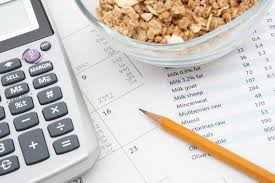Are all calories equal or are some calories more equal than others?
Calorie counting has dictated weight management programmes for decades and is based on the principle of energy in versus energy out using the calorie as a measurement of energy. The idea is that if energy input is greater than our energy output then our weight will go up and conversely if energy input is less than our energy out then we will lose weight.
Our calorific requirement has typically been dictated by sex, height and physical activity and,‘ a calorie is a calorie is a calorie,’ whether it comes from carbohydrate, fat or protein.
Well I would strongly dispute this and ask the question,
Are all calories equal or are some calories more equal than others?
In answering this question I would like you to consider the following points:
1. Its interesting to looks at the definition of a calorie,
‘ A Calorie (kcal) is the amount of energy needed to raise the temperature of 1 kilogram of water by 1 degree Celsius.’
Well Hello! can anyone tell me exactly how this relates to human Nutrition?
2. Calorie counting has been the mainstay of most weight loss diets over the past 40 years and yet obesity is on the rise.
3. On one of the reasons for low fat diets is the high calorific value of fat. Low fat diets have not served us well either.
Low fat and low calorie diets often go hand in hand and if you look at the calorific value of the main nutrients in our diet it is easy to see how this might have happened:
Protein 5.65 kcal per gram
Fats 9.4 kcal per gram
Carbohydrates 4.2 kcal per gram
In the world of, ‘counting calories,’ it would seem quite logical looking at this to say well Ok, fat is very high in calories so lets cut back on the fat and fill up on carbohydrates which are low in calories.
I hope you can see that this is merely a mathematical equation which totally ignores the complexity of how we actually digest food!
There is increasing research out there which demonstrates that how a food is used in the body is as important for weight management and overall health, as how many calories it contains.
The body is believed to selectively use calories from certain foods over and above the calories from others. So whilst certain foods may appear to be high in calories, the body may burn these more readily than those within foods that appear to have a lower calorific value.
Its also worth remembering that, ‘low calorie,’ foods often tend to be poor sources of nutrients. This can lead to deficiencies in certain vitamins & minerals responsible for maintaining a healthy metabolism and may slow down the rate at which the body is able to use calories. This is clearly counterproductive.
When it comes to weight loss please don’t count calories or go on a low fat diet. As a nutritionist I strongly believe that Low GL eating is the best way to lose and maintain weight as it is based on a sound understanding of how we metabolise our food. If you are interested in Low GL eating then please look at my weight loss programmes.All the recipes on my Recipe page are Low GL too, so do take a look. Low GL eating can also be very instrumental in reversing or controlling Type 2 diabetes, for more information here please visit my diabetes page.

